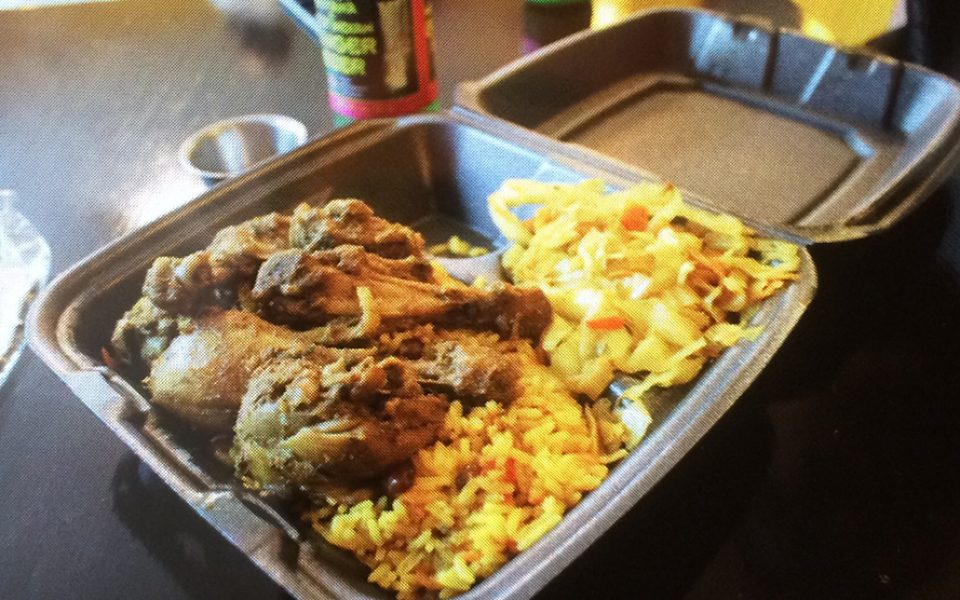Calypso Mama isn’t the sort of restaurant you’d ever walk into by accident. Positioned in the middle of a short strip of storefronts, it’d be easy to drive right by without even noticing it.
Veering right from Summit Avenue onto Phillips Avenue in northeast Greensboro, the stores come up quickly. By the time you looked back up from Google Maps on your phone, you wouldVve missed it even if youvd plugged Calypso Mama Caribbean Café in as your destination.
I’ve passed by this Caribbean restaurant across the street from WFMY News 2’s complex maybe a dozen times without ever realizing it was there, and I’m the type to keep my eyes peeled for such holes in the wall.
But recently, after stumbling across it by accident in one of my periodic Google searches — this one being “Caribbean food Greensboro” — I wheeled my car around after the Phillips Avenue off-ramp and pulled into the lot.
Loud, dancey music bumped from the speakers as at least two incense sticks perfumed the room. Bright red and yellow walls quickly reminded me of several Jamaican restaurants I’ve enjoyed, but while the food may be similar, Calypso Mama is a Trinidadian joint.
Calypso is a type of Afro-Caribbean music hailing from Trinidad and Tobago, two islands just off the Venezuelan coast. If you picture the main Caribbean islands as a semicircle, with Cuba and then Haiti and the Dominican Republic at the northernmost end and Jamaica an outlier beneath, Trinidad and Tobago are at the far, southeastern-most side, past Puerto Rico, Barbados, Grenada and several other well-known islands.
[pullquote]Visit Calypso Mama Thursday through Sunday at 1600 Phillips Ave. (GSO) or find it on Facebook.[/pullquote]There’s a steel drum on display, with mallets at the ready, but even if you didn’t know the instrument or music style hailed from Trinidad, the restaurant sports the nation’s flag as a more obvious giveaway.
The menu at Calypso Mama rotates, like many small, takeout-oriented restaurants of its kind, putting it somewhere between Quisqueya Dominican restaurant on Gate City Boulevard in Greensboro and Uncle Desi’s Jamaican in Winston-Salem. The day I walked in, the chalkboard menu said curry, stew or jerk chicken; oxtail; goat; pepper shrimp; and roti.
I immediately asked after the goat — “Is it curry goat?” I wondered. Indeed, but it would take maybe an hour to be ready, I was told, and as it was already noon, I jumped to my second choice of curry chicken. That proved to be much quicker; along with rice & beans and cabbage, the chicken waited in a cafeteria-style lineup, hot and easily spooned into a carryout tray even though I intended to sit at the lone unoccupied table.
My friend Sam, strolling in a couple minutes later, decided he was more than happy to wait what would end up being about 20 minutes for the made-to-order jerk chicken. The somewhat sweet sauce is made the day before and then applied to the freshly grilled chicken, the man behind the counter said.
Sam and I tried each other’s food, both remarking on how flavorful our meals were, and how the jerk chicken just fell off the bone. We stood out clearly as newcomers, not just as the two white dudes in the neighborhood joint in northeast Greensboro, but also because nobody else asked any questions about the setup, suggesting returning rather than new business. Our server, excited by our enthusiasm, brought out ramekins with spicy, delicious red beans for us to try, followed by a slice of baked mac & cheese pie — a favorite, he said.
I’d get both again, especially the red beans, and favored the curry to the jerk. The server had given Sam a bone of the stewed chicken too, which my friend approved of while preferring the jerk. I wished later that I hadn’t skipped over the last menu item of the day: roti, which I only knew as a sort of flatbread from the Indian subcontinent.
It turns out roti is popular in many countries, not just Pakistan, Nepal, Bangladesh and other nations in the region, but also Trinidad and Tobago. It took its own shape on the islands after being brought over hundreds of years ago by indentured workers from India, according to Public Radio International, where it mixed with culinary traditions from West Africa, China and several European countries into something all its own.
Later that night, I was talking with a friend who’s lived his whole life in Greensboro and his girlfriend who’s from Haiti, and they were joking that everyone knows everyone here and that there’s not much new to see. Channeling my inner know-it-all, I said something like, “I bet you didn’t know there’s a Trinidadian restaurant here,” to which my food-loving friends promptly flipped out and demanded details.
I showed up at Calypso Mama looking for Caribbean food, as advertised online. I was greeted by something much deeper and more interesting. And still, in my excitement about curry, I overlooked the roti, which arguably would’ve been more eye opening. The lesson? There’s always more to learn, and food is a great place to start. Especially when it’s made with as much care and contains as much flavor as Calypso Mama offers.
Join the First Amendment Society, a membership that goes directly to funding TCB‘s newsroom.
We believe that reporting can save the world.
The TCB First Amendment Society recognizes the vital role of a free, unfettered press with a bundling of local experiences designed to build community, and unique engagements with our newsroom that will help you understand, and shape, local journalism’s critical role in uplifting the people in our cities.
All revenue goes directly into the newsroom as reporters’ salaries and freelance commissions.


Leave a Reply